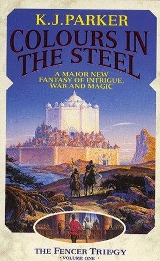Some time ago there were flames on the forums after some people continued to compare the Malazan series to Dragonlance. I started to explain that if Erikson wasn’t original it wasn’t because he copied Dragonlance, but because the idea of the Ascendants came right from Glen Cook’s “Taken”, and, before that, from greek mythology with all its meddling gods with humanized flaws.
Nothing is truly originally, especially in fiction. Everything is influenced by what was before. Literary genres are still the same, we play with the same narrative structures, the same tricks. Creativity isn’t about shaping alien concepts. It is about molding what we know into something clever or moving or sincere or authentic or spectacular.
I posted a short quote from a character in Dickens’ novel. It got my attention somehow. Now I know why.
That character is the exact copy of Erikson’s Kruppe. From the physical description to the style of dialogue it is a faithful representation. This is interesting because I used to read that Kruppe was a character that Erikson borrowed right from one of the later books in the Black Company series.
How amusing to have another proof that you can never pinpoint the origin of ideas, even when they seem so obvious.
Dickens:
Mr. Chadband is a large yellow man with a fat smile and a general appearance of having a good deal of train oil in his system. Mr. Chadband moves softly and cumbrously, not unlike a bear who has been taught to walk upright. He is very much embarrassed about the arms, as if they were inconvenient to him and he wanted to grovel, is very much in a perspiration about the head, and never speaks without first putting up his great hand, as delivering a token to his hearers that he is going to edify them.
“My friends,” says he, “what is this which we now behold as being spread before us? Refreshment. Do we need refreshment then, my friends? We do. And why do we need refreshment, my friends? Because we are but mortal, because we are but sinful, because we are but of the earth, because we are not of the air. Can we fly, my friends? We cannot. Why can we not fly, my friends?”
Mr. Snagsby, presuming on the success of his last point, ventures to observe in a cheerful and rather knowing tone, “No wings.” But is immediately frowned down by Mrs. Snagsby.
“I say, my friends,” pursues Mr. Chadband, utterly rejecting and obliterating Mr. Snagsby’s suggestion, “why can we not fly? Is it because we are calculated to walk? It is. Could we walk, my friends, without strength? We could not. What should we do without strength, my friends? Our legs would refuse to bear us, our knees would double up, our ankles would turn over, and we should come to the ground. Then from whence, my friends, in a human point of view, do we derive the strength that is necessary to our limbs? Is it,” says Chadband, glancing over the table, “from bread in various forms, from butter which is churned from the milk which is yielded unto us by the cow, from the eggs which are laid by the fowl, from ham, from tongue, from sausage, and from such like? It is. Then let us partake of the good things which are set before us!”
The persecutors denied that there was any particular gift in Mr. Chadband’s piling verbose flights of stairs, one upon another, after this fashion.
Erikson:
The slippered foot probed daintily downward, wavering until it touched ground. A rather plump calf, knee and thigh followed. The short, round man who emerged was wearing silks of every colour, the effect one of clashing discord. A shimmering, crimson handkerchief was clutched in one pudgy hand, rising to dab a glittering forehead. Both feet finally on the ground, the Daru loosed a loud sigh. ‘Burn’s fiery heart, but it’s hot!’
The short, round man blinked myopically, mopped his brow once again, then beamed a smile. ‘Representative of the City of Darujhistan? Indeed! None better, Kruppe says, though he be a lowly citizen, a curious commoner come to cast kindly eyes upon this momentous occasion! Kruppe is suitably honoured by your formal, nay, respectful welcome – what vast display, Kruppe wonders, will you formidable warriors unveil when greeting the Council of Darujhistan’s official representatives? The sheer escalation now imminent has Kruppe’s heart all apatter with anticipation! Look on, to the south – the councillors’ carriage even now approaches!’
Kruppe was the first to lower himself into a chair – at the head of the makeshift table. He held a tankard and a handful of Rhivi sweetcakes. ‘Such rustic environs!’ he sighed, round face flushed with pleasure. ‘And traditional pastries of the plains to lure the palate. More, this ale is most delicious, perfectly cooled—’
He offered everyone a broad, crumb-flecked smile. ‘But please, let us get under way lest this meeting stretch on, forcing the delivery of a sumptuous supper replete with the dryest of wines to whet the gullet and such a selection of sweets as to leave Kruppe groaning in fullest pleasure!’
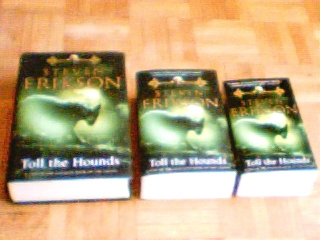
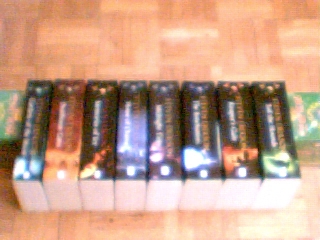
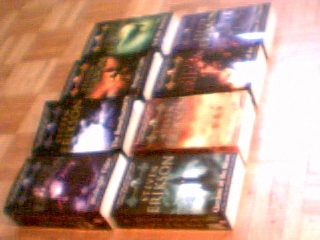
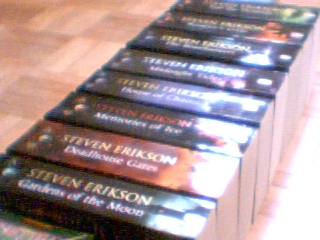
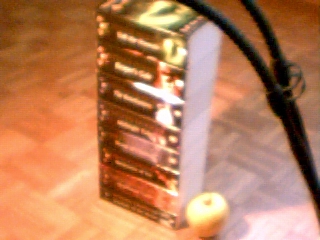
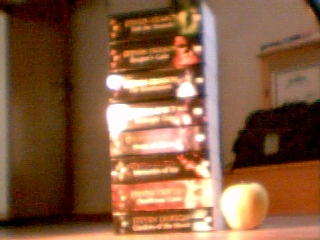
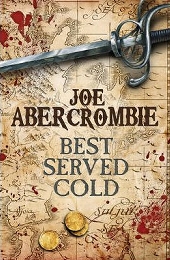
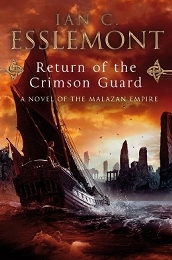

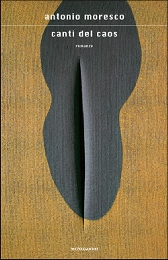
 I’m rather impressed, this is the first cover for a book by Steven Erikson that Tor publishes and that doesn’t suck. Beside the horrible green used in the name, the image is a rather faithful representation of awesome duo (minus the manservant, the real protagonist).
I’m rather impressed, this is the first cover for a book by Steven Erikson that Tor publishes and that doesn’t suck. Beside the horrible green used in the name, the image is a rather faithful representation of awesome duo (minus the manservant, the real protagonist). Return of the Crimson Guard, second book by Esslemont and suggested read after The Bonehunters or Reaper’s Gale, is out in mass market format in UK and available at the usual places. (
Return of the Crimson Guard, second book by Esslemont and suggested read after The Bonehunters or Reaper’s Gale, is out in mass market format in UK and available at the usual places. (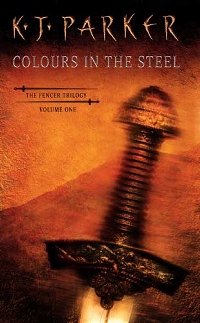 Instead of sticking to a series and read every volume before I move onto something else I try to cover as many authors I can, so that I can have a better idea of the fantasy genre as it is today. The mysterious K.J. Parker isn’t one who gets as much attention as other, more popular writers, but in comments and reviews I read she (we assume it’s a she, but the true identity is unknown and name used just an invention, being mysterious like that) has a very good reputation and more than once caught my attention. Especially when Pat posted
Instead of sticking to a series and read every volume before I move onto something else I try to cover as many authors I can, so that I can have a better idea of the fantasy genre as it is today. The mysterious K.J. Parker isn’t one who gets as much attention as other, more popular writers, but in comments and reviews I read she (we assume it’s a she, but the true identity is unknown and name used just an invention, being mysterious like that) has a very good reputation and more than once caught my attention. Especially when Pat posted 